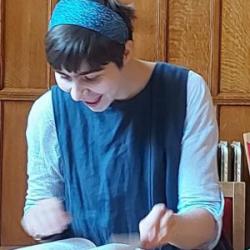Parashat Tetzaveh (Exodus 27:20-30:10)
By Adam Zemel
Tetzaveh begins when God pauses dictating instructions for the Tabernacle to consecrate Aaron and his four sons — Nadab and Abihu, Eleazar and Ithamar — as priests. The appointment reads like necessary information dispensed to get on with the instructions for the making and fabrication of priestly garments and vestments. Later, Aaron and his sons return to the text for enrobing and anointing, and to conduct the sacrificial slaughters and burnt offerings.
Reading these instructions in 2025 is a study in contrasts. I experience kinship with these ancient people, lovingly applying their dyes in the same shades that run along the edges of my tallis: blue, purple, crimson. And I am alienated by the animal sacrifices and blood-dipped toes; I do not relate to the version of Judaism being practiced in Exodus 29. But more than this braided experience of opposites, I am compelled by the text’s hyperfocus on procedures, details, designs — the particular arranging of material, by way of ritual, drawing us closer to the immaterial.
Over the years, Tetzaveh, like the parashot that surround it full of plans for the Tabernacle’s construction, has confronted readers with a question: how and why some human attempts at beauty, order, and grandeur are idolatry, while others are not. A warning in the portion’s penultimate verse brings human stakes to these divine rituals and aesthetics: “You shall not offer alien incense on it, or a burnt offering or a meal offering; neither shall you pour a libation on it” (Ex. 30:9). This prohibition foreshadows a tragedy.
In a few weeks, during Parashat Shemini, we will read how Aaron’s older sons Nadab and Abihu will burn an alien incense on the Tabernacle’s altar and disappear into fire before God. Their cousins will take their remains out beyond the Israelites’ encampment and their deaths will become an object lesson in the solemnity and rigidity of the Tabernacle’s sacrificial rites. Aaron and his remaining sons will be forbidden from mourning their dead, and the high priest will search his heart and wonder if he is to blame.
But before they are swallowed by flame, Nadab and Abihu are consecrated in Exodus 28:1, and warned about the dangers of alien incense in Exodus 30:9. Tetzaveh is basically bracketed by these two seemingly unrelated and inessential verses that will wind up intersecting in a moment of tragedy —foreshadowing.
It can be easy to forget, I think, because the weekly rhythms of our reading cycle can make its sections seem very discrete, that the Torah has all the merits of great literature: savvy plotting enriched by dramatic irony; sudden reversals yielding to grand reveals; distinct settings enlivened by significant details; circumstances that pose unanswerable moral questions. And, of course, all-too-human characters who make terrible mistakes. These are the elements, like foreshadowing, that bring a story to life, that cause us to feel as if we are inside the drama ourselves, feeling what the characters feel, living for a moment inside their experience.
That our Tanakh contains all the drama and humor and emotional intensity of literature serves to remind us of what, to me, is Judaism’s greatest gift. And there are many other gifts: I love being Jewish for the way it teaches me to think, for the way it teaches me to laugh, for the way it teaches me to stand up for some things and oppose others. I love being Jewish for the food.
But more than all of this, I love being Jewish because it teaches me that I am part of a narrative. A cycle of stories. A single story, stretching back through the generations for thousands of years, unfolding still. I am me, distinct, individual, and I am also playing a role in the grand Jewish narrative. There is no greater feeling of belonging than that of belonging to a story with the power to tell you who you are and why you matter. This is the great inheritance of the Jewish people passed down the generations. We stood at Mount Sinai.
Foreshadowing is one of those literary devices that is most effective when we’ve already heard or seen or read something at least once before. The narrative tension that takes hold in Tetzaveh and releases in Shemini reveals itself only upon re-reading, and affirms our practice of reciting the entire Torah each year. Like all great books, meaning accumulates each time we return to the text to wrestle again with things like the story of Nadab and Abihu, which ends in tragedy foreshadowed.
Adam Zemel is the communications specialist for Hebrew College in Newton, MA. He holds an MFA in Fiction from UCRiverside, and his nonfiction has appeared in the Los Angeles Times, Daily Beast, Hey Alma, and elsewhere.
















